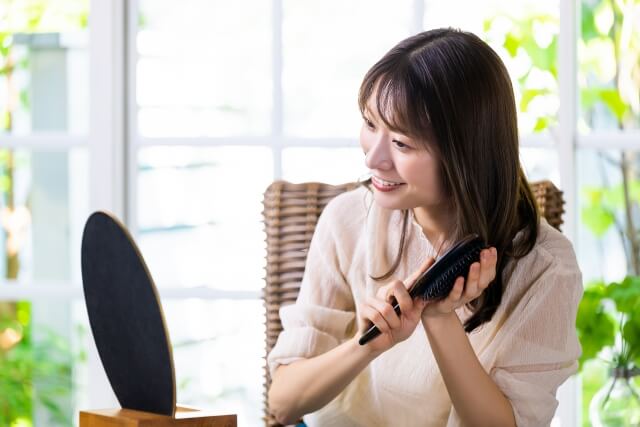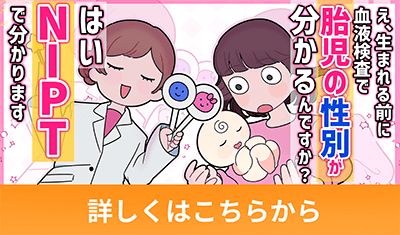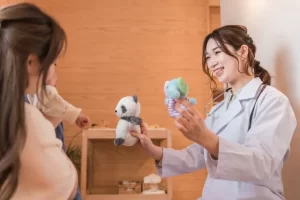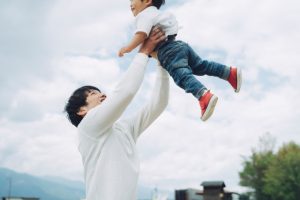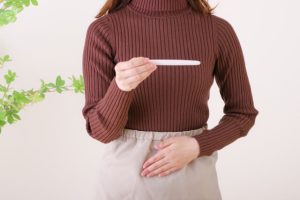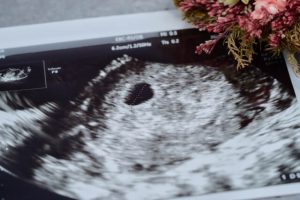Summary of this Article
Some women experience hair loss after pregnancy and childbirth. This condition, also known as postpartum hair loss or postpartum alopecia, can cause anxiety for those who are unaware of it. In this column, we will introduce the timing, causes, and solutions for hair loss after childbirth.
- Types and Overview of Miscarriage
- Five Main Causes of Chemical Miscarriage
- When Chemical Miscarriages are Likely to Occur
- Is Chemical Miscarriage Likely to Recur?
- Preventing Recurrent Chemical Miscarriages
- Consider NIPT (Non-Invasive Prenatal Testing) to Reduce Miscarriage Risk
- Frequently Asked Questions
The timing of postpartum hair loss
After giving birth, mothers may experience a temporary increase in hair loss. While the amount and duration vary from person to person, it is a common symptom experienced by most women after childbirth. Some may experience a significant amount of hair loss just by combing their hair, or find their drains clogged with hair every time they shampoo, which they may not have experienced before.
Additionally, some may experience thinning hair that reveals the scalp. Since these are symptoms that tend to improve over time, it’s important to understand when they are likely to occur after childbirth.
Hair loss typically begins around 2 to 3 months after childbirth
Concerns about postpartum hair loss usually arise approximately 2 to 3 months after giving birth. Normally, people are said to lose around 50 to 100 hairs per day, but postpartum hair loss can result in even more hair loss than usual. It’s common to notice an increase in hair in the shower drain or on your hairbrush during this time.
Since hair loss occurs during a challenging period after childbirth, not being aware of postpartum alopecia can lead to even greater stress. Therefore, it’s important to understand that postpartum hair loss can happen to anyone.
The peak of hair loss typically occurs around 4 to 6 months after childbirth
Postpartum hair loss reaches its peak around 4 to 6 months after giving birth. Many mothers may be surprised by the amount of hair they find in the shower drain or around the house during this time. However, as this period passes, the amount of hair loss tends to diminish.
This time coincides with when babies typically start crawling, a milestone that brings joy in their development. With so much focus on the excitement of their child’s growth, some mothers may find that the peak of hair loss passes by quickly without much worry.
After about 6 months to 1 year postpartum, hair loss tends to settle down
Following childbirth, hair loss typically begins to calm down and returns to a normal hair cycle after about 6 months to 1 year. New hair gradually starts to grow back, making thinning hair less noticeable. Postpartum hair loss is not permanent. There’s no need to worry excessively about it; consider it something that can happen to any mother after childbirth, and focus on taking care of your child.
5 Common Causes of Postpartum Hair Loss
The main causes of postpartum hair loss are fivefold. For those concerned about postpartum alopecia, it’s advisable to familiarize yourself with these causes and later implement the strategies I will introduce.
1.Changes in Hormonal Balance
It’s believed that changes in hormonal balance after childbirth have a significant impact on hair loss. During the later stages of pregnancy, there’s an increase in the secretion of female hormones called estrogen in a woman’s body. Estrogen is further classified into three hormones, as follows:
・Estrogen
・Estradiol
・Estriol
Among these three hormones, estradiol has the function of keeping hair in the growth phase in the hair cycle. After childbirth, as the secretion of estrogen returns to normal, the hair cycle also resumes its usual pattern. Hair that was held in the growth phase is suddenly shifted into the regression or resting phase, causing a mass shedding of hair.
2.Stress from Childbirth and Childcare
Many mothers experience stress from the unfamiliarity of childbirth and childcare. They often need to care for their baby around the clock before fully recovering their strength. As a result, stress from sleep deprivation and fatigue due to nighttime crying and breastfeeding can accumulate, potentially leading to conditions that hinder healthy hair growth.
3.Deterioration of Scalp Environment
After childbirth, women are said to have changes in skin quality due to hormonal imbalances. Continuously using shampoo that doesn’t suit their skin can excessively strip away the sebum that protects the skin, leading to a deterioration of the scalp environment. Consequently, it may become difficult for healthy hair to grow.
On the other hand, reducing the frequency of hair washing due to the busyness and fatigue of childcare can lead to the accumulation of sebum and dirt on the scalp, causing clogged pores and hindering the healthy growth of hair.
4.Nutritional Deficiency During Pregnancy and Postpartum
During pregnancy, severe morning sickness or dietary restrictions can lead to an imbalanced diet, which may prevent the production of healthy hair. Furthermore, if postpartum mothers continue to struggle with meals due to busyness, maintaining an imbalanced diet can hinder hair growth. Since hair is primarily composed of protein, ensuring an adequate intake of protein is crucial.
Some people may attempt to lose the weight gained during pregnancy through dieting after childbirth. However, extreme calorie restriction during dieting may worsen symptoms of hair loss.
5.Other Causes
Other factors that may contribute to postpartum hair loss include smoking, advanced maternal age, and difficult childbirth. Smoking is believed to cause constriction of blood vessels, reducing the circulation of nutrients to the scalp. Additionally, postpartum hair loss tends to increase in both quantity and duration as maternal age increases. Difficult childbirth can also delay postpartum recovery, potentially exacerbating symptoms of hair loss.

Postpartum Hair Loss Prevention
Postpartum hair loss is a common experience for most mothers who have given birth, although individual experiences may vary. Since it’s a natural phenomenon, there’s no need to overly worry about it. However, for those who are concerned about the change in appearance due to hair loss, it’s advisable to take preventive measures to ensure that the symptoms do not worsen.
1.Maintain a Balanced Diet
To alleviate symptoms of hair loss, it’s important to have a well-balanced diet consisting of three nutritious meals a day. Ensuring proper nutrition is crucial for nourishing the hair. Protein, in particular, is essential as it serves as the building block for hair. Therefore, aim to incorporate protein-rich foods such as meat, fish, and soy products into each meal.
Additionally, other nutrients that support hair growth include:
・Cystine
・Zinc
・Isoflavones
・Collagen
・Vitamin C
・Vitamin B2
・Vitamin B6
With the potential for hair loss prevention from various nutrients, it’s safe to say that prioritizing a balanced diet is crucial.
2.Ensure an Adequate Amount of Sleep
Just like the cells in our body, hair also undergoes cell division and growth during sleep, making sufficient sleep crucial. Ideally, it’s best to get all your sleep in one go, but for those caring for children, interruptions like nighttime crying or breastfeeding may make it difficult to get uninterrupted sleep.
Therefore, it’s essential to make efforts to ensure quality sleep even if it’s for a short duration. Avoid using smartphones right before bed, drink warm beverages to induce drowsiness, and try to avoid sleeping on carpets or sofas for short naps. Opting for a bed or futon is recommended for better sleep quality.
3.Supplementing with Nutritional Supplements
While we emphasized the importance of a balanced diet for promoting hair growth, it can be challenging to prepare and consume sufficient meals, especially amidst the busyness of childcare. In such cases, consider supplementing with vitamins, minerals, or protein to make up for any nutritional deficiencies.
It can be quite challenging to prepare three balanced meals a day while dealing with the exhaustion of childcare. Ideally, getting nutrients from meals is preferred, but if it’s not feasible, consider relying on supplements.
4.Use Amino Acid-Based Shampoo
After childbirth, it’s advisable to use an amino acid-based shampoo when washing your hair. Due to changes in body chemistry postpartum, the shampoo you used before childbirth may no longer be suitable. Some individuals may experience dry or sensitive skin as the increased secretion of female hormones returns to normal. Using a shampoo with strong cleansing properties can lead to dryness and irritation of the scalp, potentially worsening symptoms of hair loss. Therefore, opting for a gentle amino acid-based shampoo after childbirth is recommended.
5.Use Hair Growth Serum
For those who are particularly concerned about hair loss, consider trying a hair growth serum. Hair growth serums are beauty products that contain nutrients essential for the scalp and hair. They work to balance the moisture levels of the scalp, so if you’re worried about postpartum hair loss, consider incorporating a hair growth serum into your regimen as one of the prevention measures.
If you want to reduce stress before pregnancy or childbirth, consider NIPT (Non-Invasive Prenatal Testing)
Postpartum hair loss is a symptom experienced by most women. However, if you’re concerned about significant changes in your appearance, it’s essential to take steps to alleviate the symptoms. Simply adjusting lifestyle habits such as diet and sleep can potentially reduce the amount and duration of hair loss.
Furthermore, stress can also be considered as a cause of hair loss. To avoid excessive anxiety during pregnancy, it’s recommended to undergo NIPT (Non-Invasive Prenatal Testing). NIPT allows for the detection of chromosomal abnormalities in the baby through maternal blood sampling alone. Consider early testing to alleviate postpartum anxiety as much as possible.
【References】
- Read This and You Won’t Be Scared Anymore! Causes and Solutions for Postpartum Hair Loss “Mom’s Hair Loss” | Women’s Hair Growth Newsletter Beauty Hair Lecture
- Causes and Countermeasures for Postpartum Hair Loss | BELTA
- Why Does Postpartum Hair Loss Occur? Bid Farewell to Worries with the Right Care Methods | [Official] SOLIA SHOP
- When Does Postpartum Hair Loss Start and End? About Causes, Countermeasures, and Care | Fit Clinic Shibuya Sasatsuka Clinic
- 【Postpartum Hair Loss】When Does It Calm Down? Causes of Hair Loss and Recommended Care ~ Explanation by a Doctor | For FAGA Hair Loss Treatment in Chiba, Visit Mo’s Clinic | 2 minutes walk from Chiba Funabashi Station
Q&A
-
QAre there people who do not experience postpartum hair loss?Postpartum hair loss is a symptom experienced by most women after pregnancy and childbirth. However, since there are individual differences in the amount and duration of hair loss, some people may not be concerned even if hair loss occurs. When there is minimal change in hormone balance, which is considered a major cause of hair loss, the disruption of the hair cycle is small, and the symptoms of hair loss may not be noticeable.
-
QI want to know methods for scalp care.When performing scalp care, use a lotion that moisturizes the scalp. First, use the palm of your hand to massage the entire scalp. Then, use three fingers to gently lift the scalp from bottom to top. Finally, use your fingertips to press the center of the head. By preventing scalp dryness and promoting blood circulation, you can expect to reduce hair loss.
-
QAre there any ways to make hair loss less noticeable?To make hair loss less noticeable, one method is to consider making a bold hair change. For those concerned about thinning at the hairline or part, a short hairstyle is recommended. Not only does it make the part less noticeable, but it also reduces the time needed to dry the hair.
Article Editorial Supervisor

Dr Hiroshi Oka
NIPT specialist clinic, MD
Graduated from Keio University, School of Medicine
 中文
中文





